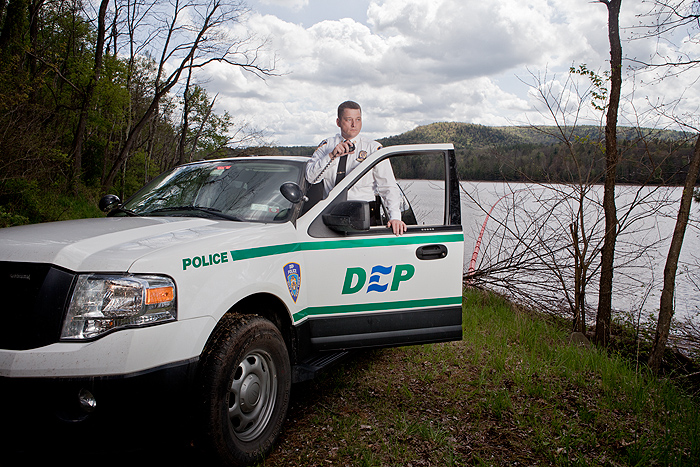Captain Brian Handy
West-of-Hudson Patrol Division
Police Department
Bureau of Police and Security
Department of Environmental Protection
Gilboa, Schoharie County
Brian Handy and his DEP vehicle parked upstream of the Gilboa Dam off State Route 990V, where Handy spent Tropical Storm Irene. Photo by Christopher Auger-Domínguez.
If the Gilboa Dam breaks, the reservoir police barracks beneath it will be the first to go.
So the morning that Tropical Storm Irene arrived, 40-year-old Captain Brian Handy drove uphill, alone.
On State Route 990V, about 50 yards upstream of the dam, Handy parked and watched the Schoharie Valley fill with water.
The dam held. But downstream, roads disappeared. Warning sirens wailed. Towns and their command centers evacuated. Communications winked out. People ran and drove to the hills in panic.
Handy heard it all.
“In one hand, I had a Blackberry,” he said. “And in the other, a radio balanced on the steering wheel.”
It was grim. “Everybody was in the same condition: “How do we get to our house?” “What are we going to do?”
From his SUV, Handy ordered his people -- DEP officers stationed from Gilboa to Ashokan -- to help.
DEP police began routing supplies around washouts. Charting road closures. Guarding sinkholes.
When other officials couldn’t respond, the DEP did. For weeks, Handy’s officers handled Schoharie County’s 911 calls.
The DEP isn’t popular in the Catskills. It’s the history: The city came in from the outside, flooded valleys, and hired a police force to protect the reservoirs that were once towns.
Still, when Handy hears negative comments about the DEP, he takes it personally.
“The thing that people don't know, or don't realize, is that we’re here,” he said. “We get labeled as the ‘big city agency,’ but we're really local people. We’ve been born here, raised here. We’re part of the community, and it impacts us too. The city's infrastructure and water supply are covering all of us.”
Interview with Brian Handy
Watershed Post: What happened to you during the flood?
Brian Handy: I run the West-of-Hudson Patrol Division for [the DEP]. So for that specific day, here in Gilboa, we were stationed here in anticipation of the wet-weather event in case Hurricane Irene decided to come. As the weather continued to come, we made all the preparations in advance that we possibly could make, and then the emergency action plan was activated.
For us, the emergency action plan required us to relocate, move our precinct, and set up an interim command post. We moved to the top of the dam and established a command post where we monitored what was going on … We would be the first impacted in a significant event at the dam. I established a command post in my vehicle. We have robust communication abilities in our vehicles. Mine's an unmarked SUV.
WP: Was it lonely?
BH: It can be.
WP: What were you doing?
BH: There are roads that are closed, there are resources to bring -- how do we get them from one place to another? And in addition to that, I have the daily operational needs of the agency. I’ve got other precincts, all of my staff, a lot of them live in the communities impacted by the floods. Their families are in those communities. How do we get people in the next shift, how do we get people home … It was an incredible amount of professionalism and dedication. No matter how much I asked them to do, they were incredibly willing and eager to do what they had to do.
WP: What do you wish people knew about that day that they don't know?
BH: That's the one thing that I would like them to know: You do see negative comments about the DEP and what they do. For me, I take it very personally. I'm here. I'm born, raised and grew up here. We are local people that comprise the DEP. We take our job very seriously and appreciate the opportunity to serve.
WP: There was a lot of panic and misinformation about the Gilboa Dam during the flood. Did you hear or respond to the rumors that the dam had broken?
BH: In the instance you’re referring to … there was some confusion at some point about a problem, and the radios got really busy. One of the concerns was that the dam had broken. We were on the dam, and we were quickly able to relay that information: “We are on the dam, there is no [break].















